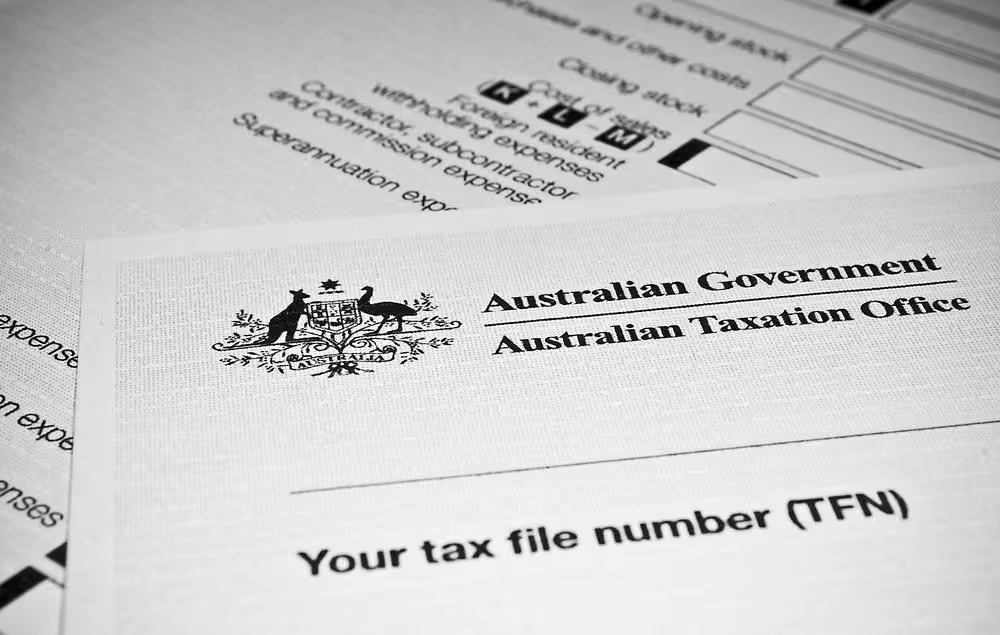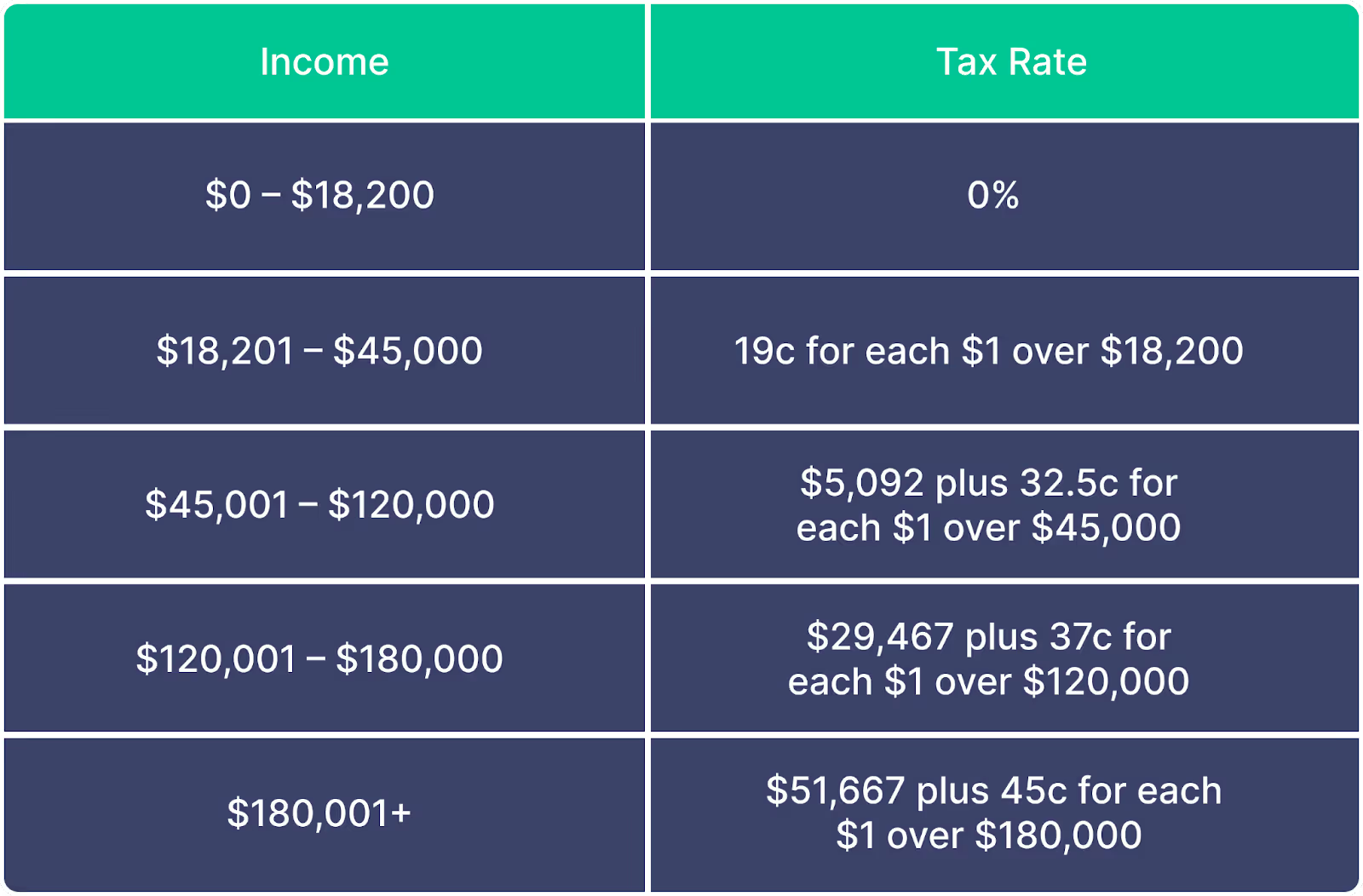.avif)
Calculate Your Crypto
Taxes in Minutes

The growth of cryptocurrency adoption has caught the attention of tax authorities all around the world. Governments are making prominent attempts to regulate cryptocurrency in terms of taxes, including taking necessary actions against any evasions. But despite this, many investors are unable to comply with the tax laws.
In Australia, the ATO, or the Australian Taxation Office, has been actively addressing the issue of crypto tax evasion, making it crucial for individuals and businesses to understand and comply with their tax obligations.
Failing to do so can have serious consequences, including penalties, legal actions, and reputational damage. In this guide, we explore the potential penalties of any crypto tax evasion and how you can address the issue to ensure legal compliance.
ATO Crypto Tax Evasion: What It Means and Types of Tax-related Crimes
ATO crypto tax evasion refers to the deliberate act of individuals or businesses evading their tax liabilities related to cryptocurrency transactions. It involves the underreporting or failure to report crypto income, capital gains, or other taxable events to the ATO.
When it comes to cryptocurrency tax obligations, individuals and businesses should be aware of the potential penalties for non-compliance.
The Australian Taxation Office (ATO) takes tax-related offences seriously and identifies two types of crimes concerning taxes: tax fraud and tax evasion.
Tax Fraud
This involves intentionally making false representations of your tax liability. These representations are considered fraudulent if you knew they were false or if you made them without genuinely believing they were true.
It could include providing misleading information about your crypto transactions or deliberately understating your tax liabilities.
Penalties for tax fraud may include hefty fines, interest charges on unpaid taxes, and, in extreme cases, criminal prosecution. If found guilty of tax fraud, individuals may face imprisonment and reputational damage, impacting their personal and professional lives.
Tax Evasion
This refers to any behaviour that results in an avoidance or shortfall of taxes. It could involve activities such as omitting income or falsely claiming deductions without a credible explanation. Even unintentional omissions that lead to tax discrepancies may be deemed as tax evasion.
For cryptocurrency users, tax evasion could occur when failing to report crypto income, capital gains, or any taxable events related to digital assets. The ATO has access to data from cryptocurrency exchanges and financial institutions, enabling them to identify potential tax evaders.
The penalties for tax evasion can also be significant and may include financial penalties, interest charges on unpaid taxes, and potential criminal charges. The ATO may issue default assessments based on available data, resulting in higher tax liabilities than if accurate reporting had been done.
How is Crypto Taxed By the ATO?
Before discussing methods to reduce your crypto taxes, it's essential to understand how the Australian Taxation Office (ATO) approaches the taxation of these digital assets.
Two types of taxes apply to cryptocurrencies: Capital Gains Tax (CGT) and Ordinary Income Tax.

Capital Gains Tax (CGT)
When you buy or sell cryptocurrencies as an investment, the ATO considers it a capital gains event. This means that any profits or losses you make from selling cryptocurrencies are subject to Capital Gains Tax. The CGT is calculated based on the difference between the purchase price (cost basis) and the selling price of the cryptocurrency.
Cryptocurrencies incur Capital Gains Tax (CGT) in the following scenarios:
- Selling crypto.
- Gifting crypto.
- Trading crypto for other cryptocurrencies.
- Converting cryptos to fiat currencies.
- Using cryptos to pay for goods and services.
Ordinary Income Tax:
If you are actively trading cryptocurrencies as a business or as a regular income-generating activity, any profits earned will be regarded as ordinary income, rather than capital gains.
The following tax events incur Ordinary Income Tax:
- Getting paid in crypto.
- Mining crypto.
- Earning staking or holding rewards.
Here are the tax rates for Australian residents.

*The above rates DO NOT include the Medicare levy of 2%.
To know all details, refer to our Australian Crypto Tax Guide.
Can ATO Track My Cryptocurrencies?
Yes, the ATO is taking steps to ensure tax compliance among cryptocurrency traders by implementing a data-matching program.
Under this initiative, the ATO is collecting bulk records from Australian cryptocurrency designated service providers (DSPs) like Binance to monitor cryptocurrency transactions and verify that individuals are paying the correct taxes. The data shared between crypto exchanges and the ATO can trace back to as early as 2014.

To comply with tax regulations, these exchanges must be registered with Australian Transaction Reports and Analysis Centre (AUSTRAC) and adhere to strict KYC policies, as well as report suspicious transaction activities to AUSTRAC.
In addition, the ATO also employs targeted audits and investigations to uncover potential tax evasion related to cryptocurrencies. They focus on specific industries, high-value transactions, and individuals with a history of non-compliance.
To strengthen their efforts, the ATO has dedicated specialised teams and task forces with expertise in cryptocurrency taxation, employing advanced auditing techniques to ensure tax compliance within the cryptocurrency space.
Legal Ways to Reduce Crypto Tax
Holding cryptos for a long term – Holding your cryptocurrency for over 12 months offers significant tax advantages. If you sell your cryptocurrency after holding it for 12 months or longer, only 50% of the gains will be subject to taxable income
Picking the suitable cost basis method – Investors have the flexibility to select from various cost basis methods permitted by the ATO, such as first-in-first-out (FIFO), last-in-last-out (LIFO), and highest-in-first-out (HIFO). These methods assist in calculating capital gains and losses during a disposal event.
For further information on the best cost-basis method to help minimise your tax liability, you can refer to our article here.
Tax-free threshold – For Australian residents, the first $18,200 of income is tax-free, including up to $18,200 in capital gains (or up to $36,400 in eligible CGT discounted gains) if there's no other income, resulting in zero tax liability as long as it remains within the tax-free threshold.
Crypto as a personal asset – Any capital gain from the disposal of a personal asset is disregarded, and you won't need to pay capital gains tax on that gain.
Crypto assets used mainly for personal purposes are classified as personal use assets. If you acquire crypto for less than $10,000 and use it for personal consumption relatively quickly, it is more likely to be considered a personal use asset. For more details, visit the official ATO website here.
How to Avoid ATO Crypto Tax Evasion
To avoid the penalties and consequences associated with crypto tax evasion, individuals should take proactive steps to ensure compliance with their tax obligations.

- Stay informed about ATO's guidelines and regulations regarding cryptocurrency taxation. Understand your obligations as a crypto taxpayer, including reporting requirements, record-keeping, and the calculation of capital gains and losses.
- Keep detailed records of all your cryptocurrency transactions, including the date, value, type of transaction, and any associated costs. This will help ensure accurate reporting and enable you to demonstrate compliance in the event of an audit.
- Seek professional advice from a crypto tax specialist. They can provide personalised guidance based on your specific circumstances, ensure accurate reporting, and help maximise deductions within the boundaries of the law.
- It is crucial to file accurate and timely tax returns, including all cryptocurrency-related income and gains. Avoid providing false or misleading information on your tax return, as this can lead to penalties and potential criminal charges.
By following these steps and fulfilling your crypto tax obligations, you can minimise the risk of being subject to ATO penalties and ensure compliance with tax regulations.
Wrapping Up
The ATO's focus on crypto tax evasion sends a clear message that non-compliance will not be tolerated. Individuals and businesses involved in tax evasion face significant penalties, potential legal action, and reputational damage. Taxpayers must understand and fulfil their crypto tax obligations, ensuring accurate reporting and compliance.
To mitigate the risks associated with crypto tax evasion, individuals and businesses are encouraged to seek professional advice from tax experts well-versed in cryptocurrency taxation.
Crypto tax software like Kryptos takes out the hassle of staying up-to-date with all the latest ATO guidelines and allows you to calculate your crypto taxes accurately in just a few minutes. Simply import your transactions from 2000+ DeFi protocols, 100+ wallets and exchanges, and supported NFTs.

The app updates all your tax liabilities in a single dashboard and allows you to save taxes ethically while staying fully compliant with the ATO tax laws.
Want to know more? Sign Up Now for free.
FAQs:
1. What are the penalties for crypto tax evasion in Australia?
Penalties for crypto tax evasion in Australia can vary based on the nature of the offence but can include financial penalties of up to 75% of the tax shortfall amount, potential interest charges, and possible criminal prosecution in severe cases.
2. Can tax evasion in the crypto space lead to criminal charges?
Yes, tax evasion, including in the crypto space, can lead to criminal charges. It's considered a serious offence and could result in imprisonment, in addition to financial penalties.
3. How can tax evasion affect an individual's personal and professional reputation?
Tax evasion can greatly damage an individual's personal and professional reputation. It could lead to legal consequences, loss of professional licences, difficulty in obtaining employment or business partnerships, and could also impact personal relationships and trust.
4. What are the consequences of ATO crypto tax evasion for businesses?
ATO crypto tax evasion for businesses can result in significant financial penalties, potential criminal charges against business leaders, loss of business licences, and reputational damage that could negatively impact future business opportunities and stakeholder relationships.
5. How can businesses protect themselves from potential tax evasion allegations?
Maintaining thorough and accurate financial records, ensuring they comply with all tax obligations, seeking professional advice for complex tax matters, implementing strong internal controls and auditing processes, and staying updated with changes in tax laws and regulations.
All content on Kryptos serves general informational purposes only. It's not intended to replace any professional advice from licensed accountants, attorneys, or certified financial and tax professionals. The information is completed to the best of our knowledge and we at Kryptos do not claim either correctness or accuracy of the same. Before taking any tax position / stance, you should always consider seeking independent legal, financial, taxation or other advice from the professionals. Kryptos is not liable for any loss caused from the use of, or by placing reliance on, the information on this website. Kryptos disclaims any responsibility for the accuracy or adequacy of any positions taken by you in your tax returns. Thank you for being part of our community, and we're excited to continue guiding you on your crypto journey!
| Step | Form | Purpose | Action |
|---|---|---|---|
| 1 | 1099-DA | Reports digital asset sales or exchanges | Use to fill out Form 8949. |
| 2 | Form 1099-MISC | Reports miscellaneous crypto income | Use to fill out Schedule 1 or C. |
| 3 | Form 8949 | Details individual transactions | List each transaction here. |
| 4 | Schedule D | Summarizes capital gains/losses | Transfer totals from Form 8949. |
| 5 | Schedule 1 | Reports miscellaneous income | Include miscellaneous income (if not self-employment). |
| 6 | Schedule C | Reports self-employment income | Include self-employment income and expenses. |
| 7 | Form W-2 | Reports wages (if paid in Bitcoin) | Include wages in total income. |
| 8 | Form 1040 | Primary tax return | Summarize all income, deductions, and tax owed. |
| Date | Event/Requirement |
|---|---|
| January 1, 2025 | Brokers begin tracking and reporting digital asset transactions. |
| February 2026 | Brokers issue Form 1099-DA for the 2025 tax year to taxpayers. |
| April 15, 2026 | Deadline for taxpayers to file their 2025 tax returns with IRS data. |
| Timeline Event | Description |
|---|---|
| Before January 1, 2025 | Taxpayers must identify wallets and accounts containing digital assets and document unused basis. |
| January 1, 2025 | Snapshot date for confirming remaining digital assets in wallets and accounts. |
| March 2025 | Brokers begin issuing Form 1099-DA, reflecting a wallet-specific basis. |
| Before Filing 2025 Tax Returns | Taxpayers must finalize their Safe Harbor Allocation to ensure compliance and avoid penalties. |
| Feature | Use Case Scenario | Technical Details |
|---|---|---|
| Automated Monitoring of Transactions | Alice uses staking on Ethereum 2.0 and yield farming on Uniswap. Kryptos automates tracking of her staking rewards and LP tokens across platforms. | Integrates with Ethereum and Uniswap APIs for real-time tracking and monitoring of transactions. |
| Comprehensive Data Collection | Bob switches between liquidity pools and staking protocols. Kryptos aggregates all transactions, including historical data. | Pulls and consolidates data from multiple sources and supports historical data imports. |
| Advanced Tax Categorization | Carol earns from staking Polkadot and yield farming on Aave. Kryptos categorizes her rewards as ordinary income and investment income. | Uses jurisdiction-specific rules to categorize rewards and guarantee compliance with local tax regulations. |
| Dynamic FMV Calculation | Dave redeems LP tokens for Ethereum and stablecoins. Kryptos calculates the fair market value (FMV) at redemption and during sales. | Updates FMV based on market data and accurately calculates capital gains for transactions. |
| Handling Complex DeFi Transactions | Eve engages in multi-step DeFi transactions. Kryptos tracks value changes and tax implications throughout these processes. | Manages multi-step transactions, including swaps and staking, for comprehensive tax reporting. |
| Real-Time Alerts and Updates | Frank receives alerts on contemporary tax regulations affecting DeFi. Kryptos keeps him updated on relevant changes in tax laws. | Observe regulatory updates and provide real-time alerts about changes in tax regulations. |
| Seamless Tax Reporting Integration | Grace files taxes using TurboTax. Kryptos integrates with TurboTax to import staking and yield farming data easily. | Direct integration with tax software like TurboTax for smooth data import and multi-jurisdictional reporting. |
| Investor Type | Impact of Crypto Tax Updates 2025 |
|---|---|
| Retail Investors | Standardized crypto reporting regulations make tax filing easier, but increased IRS visibility raises the risk of audits. |
| Traders & HFT Users | To ensure crypto tax compliance, the IRS is increasing its scrutiny and requiring precise cost-basis calculations across several exchanges. |
| Defi & Staking Participants | The regulations for reporting crypto transactions for staking rewards, lending, and governance tokens are unclear, and there is a lack of standardization for decentralized platforms. |
| NFT Creators & Buyers | Confusion over crypto capital gains tax in 2025, including the taxation of NFT flips, royalties, and transactions across several blockchains. |
| Crypto Payments & Businesses | Merchants who take Bitcoin, USDC, and other digital assets must track crypto capital gains for each transaction, which increases crypto tax compliance requirements. |
| Event | Consequences | Penalties |
|---|---|---|
| Reporting Failure | The tax authorities can mark uncontrolled revenues and further investigate. | Penalty fines, interest on unpaid taxes and potential fraud fees if they are deliberately occurring. |
| Misreporting CGT | Misreporting CGT Error reporting profits or losses can trigger the IRS audit. | 20% fine on under -ported zodiac signs, as well as tax and interest. |
| Using decentralized exchanges (DEXs) or mixers without records | The IRS can track anonymous transactions and demand documentation. | Possible tax evasion fee and significant fine. |
| Disregarding Bitcoin mining tax liabilities | Mining reward is considered taxable income, and failure of the report can be regarded as tax fraud. | Further tax obligations, punishment and potential legal steps. |
| Foreign crypto holdings: Non-disclosure | Foreign-accepted crypto FATCA may be subject to reporting rules. | Heavy fines (up to $ 10,000 per fracture) or prosecution for intentional non-transport. |
File Your Crypto Tax in Minutes










